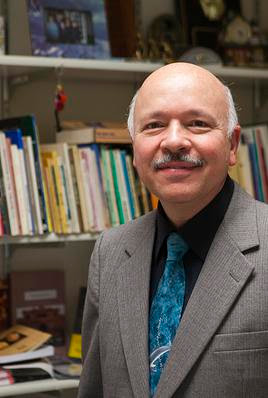“Working Man”by Armando Gonzalez Maria was in her room, sitting in a chair next to her bed, praying while holding her wooden rosary necklace. She was waiting for her husband to come home. She prayed that Miguel, her husband, wouldn’t work so much. Even on weekends, instead of being with her, he mostly spent it working. His wife used to tell him to stop telling people he was available to work because then he would have a lot of work, and most likely would end up working all week with little to no rest. Miguel didn't seem to mind though. He liked working. Miguel left around eight in the morning. That morning, before he left, as he sat on their bed and was putting on his pants, Maria asked him what time he thought he would be back. He said probably eleven in the morning. While Maria was currently praying, it was soon going to be one in the afternoon. She hoped he didn’t lie to her. After she felt satisfied with the amount of praying she had done, she began thinking of what could still be done around the apartment. Although she had basically completed all the necessary work, she still behaved like an employee on the clock, trying to find something to do so as to avoid being seen by their bosses doing nothing. She first went to the kitchen to see if the floor needed to be mopped. There were some footprints on the kitchen floor, most likely from Miguel’s boots when he was mowing lawns. It should have only taken somewhere around five minutes or less to clean it but she took her time. After she was done mopping the kitchen floor, she checked to see if there were any dirty plates in the kitchen sink. There were only two dishes and three glass cups. She washed them, just as slowly as she mopped the floor. After the dishes, she checked the wooden living room floor, but unsurprisingly, it was pretty clean. She checked all around the apartment to do any kind of cleaning, but there just wasn’t anything to clean. She thought of praying some more, but she didn’t think it was necessary, as she was taught by attending mass over the years, that it’s more about the sincerity behind a prayer than the amount of praying one does in a day. Suddenly, Maria got the idea to go to church. If Miguel wasn’t going to come home anytime soon, then she would go to church, even if it wasn’t Sunday. She knew that Miguel would get annoyed if she did this, and ask her why she went to church, even if she told him there was nothing to do at home. She ignored these thoughts. She changed into a loose fitting dress, brushed her hair and put on black block heels. Before she left, she told her kids if they were hungry, to serve themselves a bowl of the albóndiga soup she made. She told them that she would be back in an hour, and if their dad asked where she had gone, to tell them she had gone to church. On her way to church, although she felt like she was partially going to church out of spite, she felt happy. She was happy because she felt like she was improving, becoming a more resilient person, each time she went to church. This happiness slowly faded away though, when she tried to push open the front doors of the church, only to find they were locked. She was very confused. She thought the church was open at all times. She went to the back of the church to see if there wasn’t possibly a mistake. When she was in the back of the church, standing behind a black steel gate, she expected there to be parked cars and people walking across the parking lot of the church, but instead she didn’t see any cars and or anybody walking. Just then, she saw someone. There was a man, coming out of the side doors of the church, who then started walking across the parking lot. As soon as she saw him, she yelled: “¡Señor! ¡Oiga!” The man stopped and turned towards the direction of where the yelling was coming from. He squinted his eyes, trying to find whoever it was who was yelling. Finally, his eyes met hers, and he began walking towards Maria. “¿Está cerrada la iglesia? ¿Pensé que estaba abierta toda la semana?” “Antes sí. Pero ya no porque gente de la calle se estaban metiendo, y eso estaba molestando a la gente.” “¿De verdad? Nunca sabía que eso podía pasar. Bueno, gracias por decirme.” She walked away, a bit saddened and disappointed. She was looking forward to going to church, especially since it was her first time going to church on a weekday. Unsure of what to do, she began walking home. All she wanted was to spend some time with Miguel. Now she couldn't even go to church on a weekday, which she thought wasn’t asking for much. When she came back home, to her surprise she saw Miguel’s green truck parked on the curb right in front of their apartment. She remembered when he first brought the truck home, it was so bright and shiny. Now, because the car stood out in the sun for some years, the green paint was so faded that it almost looked like there were clouds painted on the hood and roof of the car. He bought the car from his boss, who sold it to him cheaply. When he brought home the truck, it seemed to Maria like a luxury, to be able to have another car. Now, she despised the truck, just the sight of it made her angry, because it symbolized one thing to her: money. Part of the reason her husband had bought the truck wasn't only because he wanted another car, but because he saw an opportunity to make money. The green truck enabled him to go quickly from lawn to lawn, with all the necessary equipment in the bed of the truck. She opened the door to the living room. One of her sons, Daniel, who although wearing headphones that prevented him from hearing her come in, still did not turn around even when a line of sunlight directly hit the screen of the computer he was using when she opened the door. She was about to tap his shoulder to ask if his dad was home when she heard someone coming from the kitchen and down the hall to where she was. It was her husband, wearing his gray, long sleeve shirt, which was now sweaty and dusty and grass stained. Sweat poured down from his balding head. On top of his head were thin, short strands of hair, which were matted down from wearing a hat, which almost made him look like a newborn baby that was just taken from their mom’s womb. He was sucking on his long neck bottle of Corona. “¿A dónde fuisteis?” He took a sip of his beer. “Fui a la iglesia, pero no estaba abierta.” “¿A la iglesia? Pero no es el fin de semana.” “Ya sé.” Her husband said nothing, just took another sip of his beer. “¿Qué hiciste de comer?” “Albóndigas.” She walked to their room. While she was taking her block heels off and putting them under her bed, she asked him, “¿Pensé que ibas a llegar a las once de la mañana?” “Yo pensé que iba a llegar en ese tiempo, pero los chinos querían que hiciera otro trabajo, y los acaparadores también me pidieron que hiciera otra cosa.” “¿Por qué no les dices que no puedes, pero que lo puedes ser para otro día.” “Pues, es que no quiero quedar mal con la gente. Es importante que les diga sí, o no sería capaz de hacer más dinero.” He reached into his pocket to get his black worn out wallet and took out four twenty dollar bills and showed them to Maria. When she saw the bills, this did little to nothing to change the indifferent expression on her face. “Gané ochenta dólares hoy. Y todavía hay dos personas que no me han pagado.” “¿Son las mismas personas que no te pagaron la última semana? “Uno sí. Es el blanco.” “Deberás parar de trabajar por él. Nomás se está haciendo tarugo.” “Ya sé, ya sé. A lo mejor sé.” “¿Ya quieres comer?” “Sí, dame.” Maria walked to the kitchen to heat up the pot of albóndiga soup and got the griddle to heat some tortillas. Miguel took his time drinking his beer and then slowly walked over to the small kitchen. Once he sat down on a chair, Maria asked him “¿Cuántas horas trabajastes?” “No más de cinco horas.” “¿No más cinco horas?” Miguel, unsurprised at his wife’s reaction, chuckled. “Cinco horas no es mucho.” “Y te aseguro que no descansaste.” “Los hombres no se cansan,” he said. “Ya para diciendo eso. Los hombres pueden sentirse cansados,” she said with her face hardened, tired of the joke. Miguel laughed, his head bouncing up and down, and said, “Okay, okay.” Once the albóndiga soup was hot enough, Maria got a bowl from the cupboard and started pouring the soup into the bowl. As she was pouring the soup and albóndigas into the bowl she was holding, Miguel asked her “¿Por qué fuistes a la iglesia a hoy?” “Pues, no más se me ocurrió.” Her husband, suddenly serious, didn’t immediately answer. “No creo que sea necesario ir a la iglesia hoy.” “Ya sé, pero me gusta ir a la iglesia cuando puedo.” Maria placed the bowl of albóndiga soup in front of him. He didn’t eat more than one albóndiga when he asked: “Deberías enfocarte en lo que ser en la casa en vez de pensar en la iglesia.” “No había nada que hacer aquí. Terminé todo.” “¿Y no te vas a cansar mucho yendo a la iglesia durante la semana?” “Si vamos a hablar de quién se cansa más, vamos a hablar de ti.” Her husband laughed. “¿Por qué te rías?” “Okay, pero yo me canso por una buena razón,” he said with a grin on his face. For the first time, she laughed, too, out of impatience for the way her husband spoke to her. “De verdad tienes un problema. No más quieres trabajar, trabajar y trabajar. Dices que trabajas de necesidad, pero te pasas, como si no tuvieras dinero. Algunas veces, en el momento que vienes del trabajo, ya te quieres pelar para trabajar otra vez, no comas muy bien o no me dices que ya te vas a ir. Y cuando–—no me callas, deja mi de hablar–—llegas de tus otros trabajos a la casa, estás irritado, te enojas cuando los niños o yo no te ayudamos rápidamente a bajar todas tus herramientas del camión. Tú solo te haces infeliz por hacer algo que es de necesidad.” “¿Qué quieres que haga? Si trabajo mucho, me canso, pero tengo dinero. Si no trabajo mucho, no estoy cansado, pero voy a tener poco dinero. Si realmente quieres que trabaje menos, ¿por qué no me ayudas o encuentras un trabajo?” “Miguel, tú ya sabes que no puedo ser eso.” “¿Por qué no? Creo que puedes hacer la mayoría de lo que no haces ahora y seguir trabajando.” “¿Qué estás diciendo? ¿Que no trabajo?” “¿Piensas que estar sentado casi todo el día es trabajo?” he said and laughed a mocking laugh, which made him appear like a child. “Ya me estás ofendiendo.” “Pues, no te mates.” “¿No me mato? ¿Tú piensas que pudieras tener un trabajo y llevar a las niños a la escuela, comprar y hacer de comer, llenar la botella de agua, llevar los platos, limpiar la casa, lavar la ropa, tirar la basura, juntar a los niños de la escuela, y dar atención a los niños?” “Todo lo que dijiste son trabajitos que se pueden hacer rápido.” “No se puede prestar atención a los niños rápido, solo se puede hacer lentamente y con paciencia.” Fed up with her arguing, he got up and left. “¿A dónde vas?” “Voy a regar el zacate.” She was going to say more to him, but she knew when to stop talking, because at some point, in the middle of an argument, her husband would eventually start to tune out everything she said, even when she did have a point. She noticed he had barely eaten anything from his bowl. From where she was sitting at the small kitchen table, she could hear him in the backyard getting the hose to water the front lawn. She didn’t know what to do. After sitting in silence for a few minutes, she got up to get her wooden rosary from their room, and started to pray once again.  Armando Gonzalez is Chicano, born and raised in Santa Ana, CA. He has one published story in Somos en escrito called “Haircut” (click here to read it).
0 Comments
Frida |
Archives
July 2024
Categories
All
|
Donate and Make Literature Happen
is published by the Somos En Escrito Literary Foundation,
a 501 (c) (3) non-profit, tax-exempt corporation. EIN 81-3162209








 RSS Feed
RSS Feed